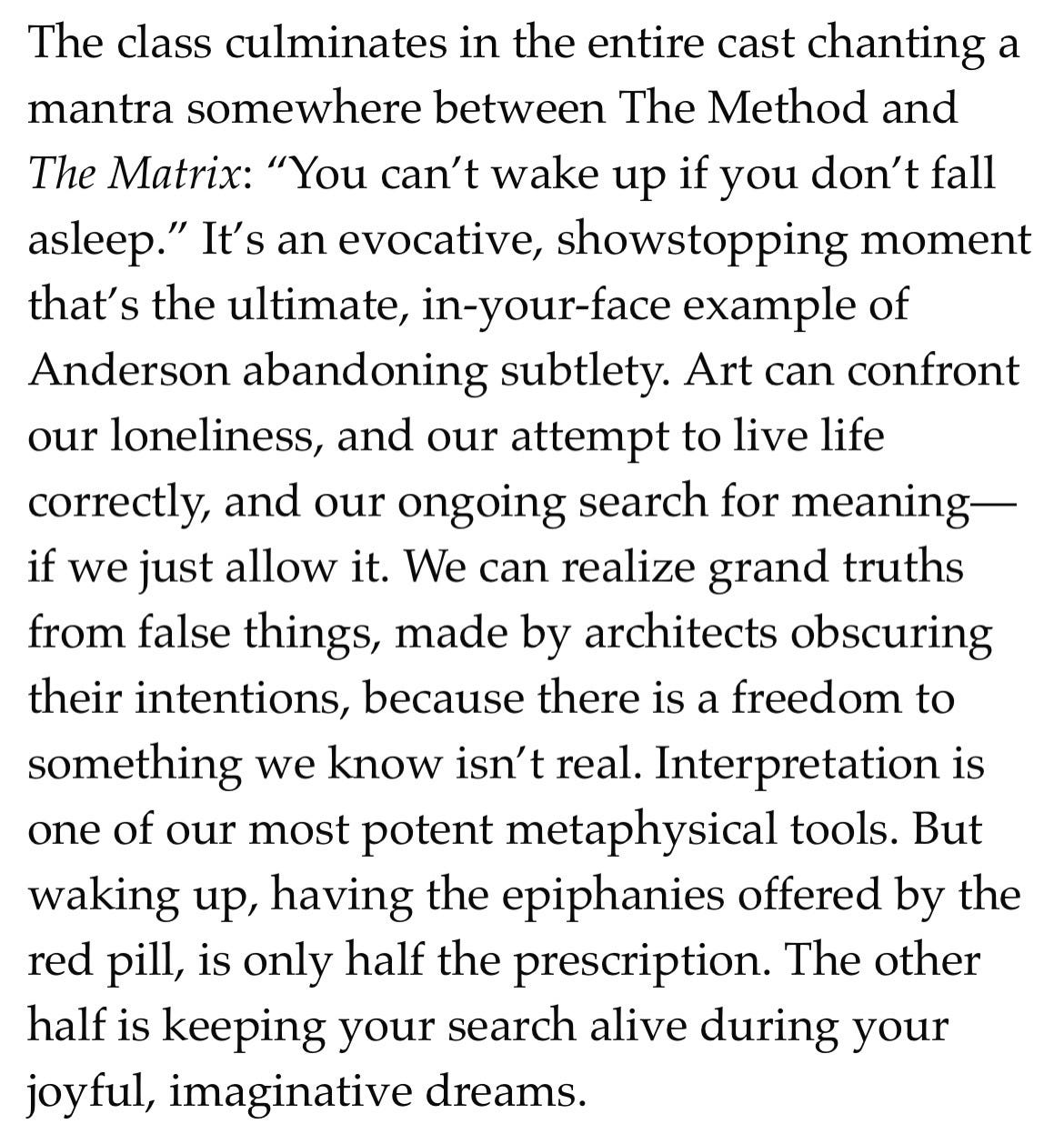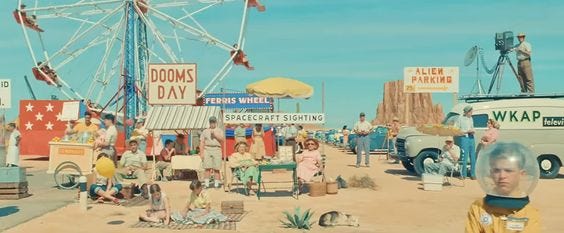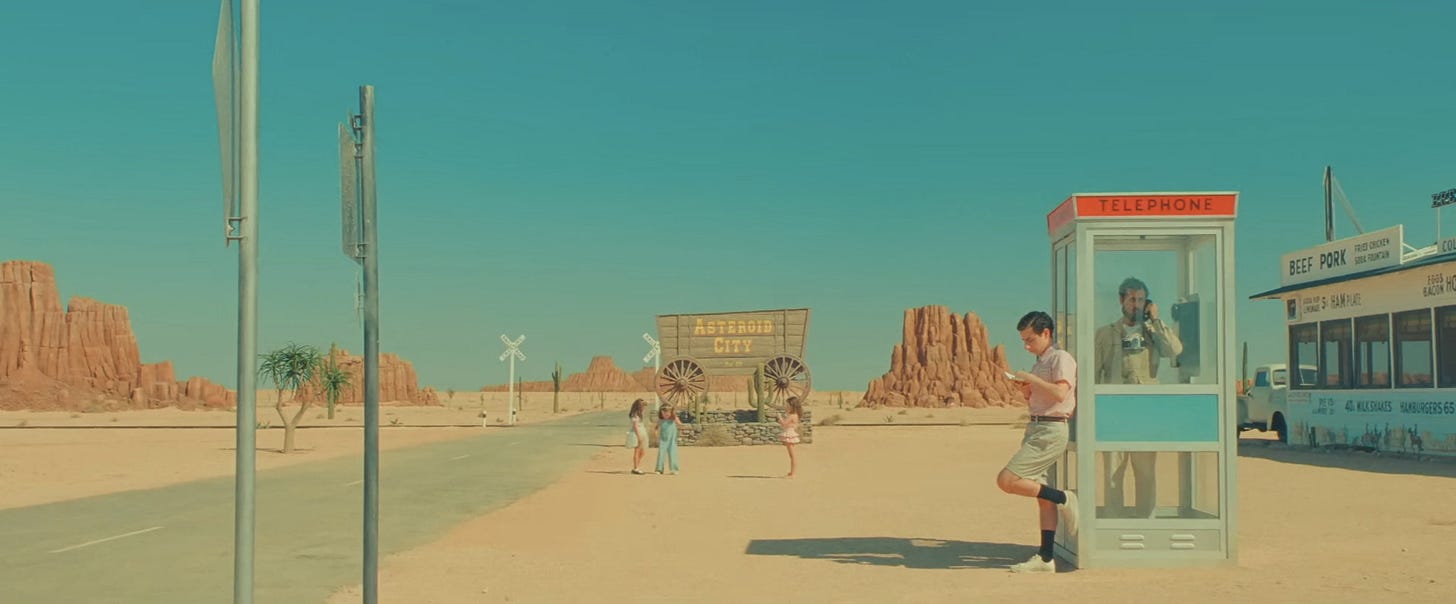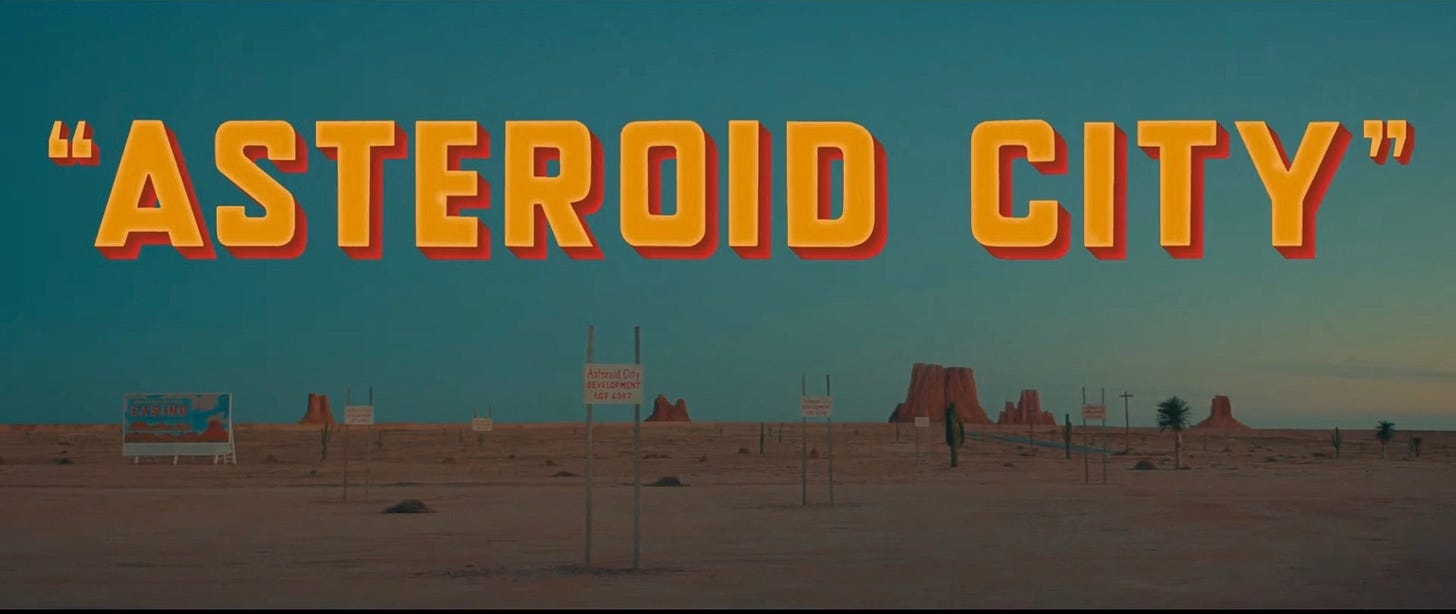Spoilers for Asteroid City, of course.
“I still don’t understand the play.”
“You don’t have to. Just keep telling the story.”
Now, I love Wes Anderson. And I loved Asteroid City. On my off day from work, I took the train down to “my” theater, where I work, to go see it. In an almost empty theater, I saw it for the second time, and I was, perhaps, more in love with than the first time. There was something different about it this time. The first time I saw it, my father came with me, day after I’d come out to my parents, his elbow nudging me when Margaret Qualley says the word “lesbian” in Ethan Coen’s Drive-Away Dolls trailer. With my father at my side, the movie experience was different than this time, when instead I was alone.
And I can’t explain why it was different, but it was. And I feel differently about it now, like I love it more. I don’t understand why Augie burns his handle on the Quickie Griddle or why the alien steals the meteor only to put it back, but I know that I love it so much that now I’m writing this thing about it. Take all of this with a grain of salt, if you’d like, because I am.
It seems to me that one of the themes of Asteroid City is that even without meaning - or even if it is unknown to us - something still matters and we must keep going. Asteroid City is about grief. Augie Steenbeck, and by extension - Jones Hall, is told “use your grief.” What else is there to do with grief but channel it into art? It just sits in your belly, growing into something real nasty. Some days, grief kept quiet, and sometimes it grew into a person and took my place in the home. At the same time, I was developing as a writer, as an artist, and all my anger, all my grief, got poured into it. There was nothing better to do with it, so I used it, the same way Augie does when he reads the lines of the scene out to Midge Campbell from the opposite window.

Jones Hall and Conrad Earp have only one scene together with just the two of them (and one or two more in which they do not speak directly to each other) but this seems to influence the entire film. Their relationship - their romance - brings deeper meaning to the story, their connection changing the course of the play. Bryan Cranston’s character tells us that Jones Hall and Augie Steenbeck became each other, and the actors in the play seem to blur the lines between character and player. It seems as though the more life they each live, the more meaning is embeded in the play, the greatest of this being Conrad Earp’s death.
Jones Hall spends every night playing a character who grieves his wife, while quietly, privately grieving his lover, who cannot be grieved in public. This grief changes the play. Jones - once sure of why Augie burns his hand on the Quicke Griddle - now searches for meaning after Conrad’s death, asking the director what it all means, is he doing it right? is he good? He performs grief every night to a crowd without fully understanding the depth of it. But now, with the death of his lover, he does, because now it is real. Augie and Jones both feel lost and unable to move on, but it is through this grief that Jones is able to understand the play.
The kiss between Jones and Conrad alters the meaning of the movie, and eventually, allows Jones to understand the play, or by extension allows us, the audience, or at least me, to understand it.
Asteroid City is odd. The silly alien, the odd characters quarantined together, the random cop car chases. They spend their lives preparing for the possiblity of an alien, but when it arrives, there is nothing you can do but stare at it. Grief is like this, like an alien stopping by to pick up a meteor. No matter how long you think about it, you cannot prepare for it. It simply… arrives. And like it sends the town into a frenzy, it sends you into a frenzy. You name a city after it, you spend ages thinking about how it will arrive, but you cannot possibly imagine it until it’s there. The clock does not understand what the little blips and dots mean, has no idea when the alien will arrive. Maybe the alien is personified grief. Maybe it isn’t.
Augie and his family are permanently altered by the events that take place during the week in Asteroid City, but still, life goes on like nothing happened. The atom bomb tests take place, the cop chases down the car, the roadrunner dances. But they are different now. Grief alters and changes, but the world around you continues on. And maybe it creates meaning, and maybe it doesn’t. There’s no right way to act, no right way to grieve.
Jones steps off stage to speak to the director, to ask him his questions, but the play carries on. It is almost ready to go on without him. The dead stay that way, and life moves forward.
Maybe you’re in love with a playwright who writes a play about you, for you, before he even knows you, about how you can’t get over his death, which hasn’t happened yet. Or maybe it’s nothing at all. But it doesn’t matter. You tell the story anyways.
I thought more about writing about my own grief in this piece, but I think that I’ve had it for so long that it doesn’t stick out anymore. It exists as part of me, my body growing around it. I’d like someone to take it away from me, to scrub it off my skin until my scrapes and scars and freckles, and it too, are all gone. But at the same time, to experience grief gave life a greater meaning. A reminder that it all ends, and one day we will all return to dirt, all those that I have loved. It’s hardly a revolutionary way to look at grief, but it’s as honest as I can be. Mourning for my friend, mourning for the girl I used to be, mourning for those not dead yet.
Even if I don’t always understand Wes Anderson’s stories, they always resonate deeply within me. I barely understand this article myself, but I do know that Asteroid City has left a mark, and I continue to think about it hours, days after watching it. But it’s one of those movies that helps me to better understand my own grief that still lives within me years later, all my melancholia, all my loneliness.
The terrifying, mysterious ordeal of grief and aliens in Asteroid City, USA.




